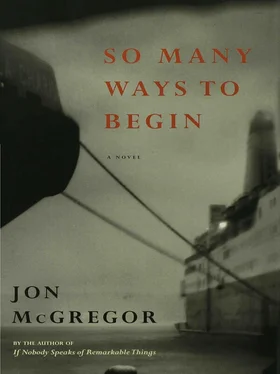He said — he whispered — bloody hell. I feel like I hardly know you. She opened her eyes.
You do too, she murmured, you know me well enough.
No, but really I mean, he said, bringing his leg up towards hers, running his hand down her thigh, there must be plenty that I don't know at all. She pressed a finger to his lips, smiled, and closed her eyes. She opened them again after five minutes or ten minutes or an hour, and looked at him.
Are you awake? she whispered. He looked back at her.
Just about, he said. She shifted a little closer to him.
Would you tell me something? she said. Would you tell me something nice so I can get to sleep?
18 Disciplinary letter, typewritten on headed paper, January 1968
Your failure to fulfil the obligations of your position, or to meet the reasonable requests of your superiors, has been noted.
There were weeks when the only time he spoke to his mother was to ask her again what she knew. There must be something else, he would say. A second name, a date of birth. Tell me something, please. Why didn't you tell me before? he would ask again. And his mother would insist that there was nothing else, that there was no more she was hiding from him, that she knew she'd done wrong but could he please stop all of this, it was breaking her heart. He would always leave the room when she said that, slamming the door behind him.
It was like a hunger, an insatiable hunger, this need to know. There were weeks, months, when he could think of nothing else, could hear nothing else besides the slow refined sigh of Julia's voice, saying the words over and over again. Of course we never saw the poor girl again. You'll have to keep the little darling. Did I say something wrong? Of course we never saw the poor girl. The words repeating like a stuck record in a locked room, haunting him, so that he could get to sleep only by drinking too much and leaving the radio on, loud. You'll have to keep the little darling. We never saw the little darling. You'll have to keep the poor girl. And of course she disappeared off the face of the earth. Did I say something wrong?
He thought about leaving home, about cutting himself off and starting again, about never speaking to his mother again, but he was too numb to do anything about moving out, and his mother was the only person he could ask for answers, and so he stayed, seething with hurt and anger and betrayal and loss, wishing he'd never found out.
And even when he was at work he struggled to concentrate, his thoughts blurred by the many questions he wanted answering: why he'd never been told; why he'd never suspected; whether Susan was lying when she said she'd never known; what he could do now to find the answers he was looking for, to find the people he'd never known he'd lost. One of the curators would ask him to repair a broken display cabinet, to rewrite an outdated label, to take a parcel to the post office, and within moments of being asked he would forget, sitting down on a gallery chair, or in the staffroom, or in the pub, knocked off his feet again by the memory of Julia's words. His colleagues started to comment, joking about his forgetfulness, his empty stare, his vacant tone of voice. The Director called him into the office to discuss his attitude towards work.
The poor girl hadn't even left you with a name, so we chose David, after that actor, what was his name? And of course, she disappeared off the face of the earth. What was his name?
Your difficulties with punctuality, and with timekeeping in general, have become of increasing concern.
He was surprised, when he asked, that it had taken him so long to think of it. What did Dad say when he found out? he said, and as soon as he'd said it he knew what the answer would be. His mother was in the back garden when he asked her, kneeling over the border, pulling out weed seedlings and heaping them into a small basket. How did you tell him? he asked, something cold and fearful turning over in his stomach. She straightened up, pulling her gloves off before answering him. She seemed uncertain what to say.
David, she said, and she looked up at him.
Did you even? he asked quietly. She put the gloves back on and pulled more weeds out of the dry soil, working her way around the thickly spiked stem of a rose bush.
I thought it was best, she said. He'd been home at the right time, she said. She pulled a bulb out by mistake and pushed it quickly back in, packing the soil in around it. Her voice was stretched and thin. The dates fitted, she said. I didn't think he needed to know. David turned away before she'd finished speaking. I thought he'd find it easier, not knowing, he heard her say, her voice falling away into the earth.
Sometimes, it was light outside before he was able to sleep. He would sit on the edge of the bed, reading, listening to the radio, his hands shaking. Or he would stand by the window, looking out at the lamplit blur of the night sky, hearing the occasional shouts and sirens drift faintly across the city. Or he would slip out of the house and walk through the shadowed streets, thinking, unable to think, trying to pound some sleep into his tired body. His colleagues got used to him rushing through the front door half an hour or an hour late, toast crumbs around his mouth, his shirt tucked in and his tie knotted as he ran from home. I'm sorry, I slept through the alarm, he would say, and Maureen on the front desk would usually reply that he didn't look as if he'd slept at all, beckoning him over to straighten his collar and tell him to wipe his mouth before the seniors saw him. They started to joke about it in the staffroom, marking up a graph of his arrival times on the noticeboard, and he had no answer when Malcolm asked him what was on his mind so much these days, and he could only smile and pretend to look embarrassed when Anna said odds on it's a woman and they all laughed. It was easier to let them think like that. He wouldn't have known where to begin if he'd wanted to tell them what it really was.
Your misuse of museum time and resources has also been noted, with particular regret.
He went to the archive office at the Royal London Hospital in Whitechapel, where Julia and his mother had worked, and under the pretence of a research project he searched through the lists of patients in the maternity wing at the relevant time. But he found nothing. He contacted trades unions, and Irish emigrant workers' associations, and even tracked down a domestic service museum in Bath, looking for more archives he could search through, looking for a box of files which would reveal a line of detail on a Mary who had stopped work suddenly in 1945. But he found nothing. Domestic employment tended to be rather informal, he was told. The names weren't always recorded, or even known. He went to Somerset House and found that the entry for his own birth matched the birth certificate he had, listing his mother and father as Dorothy Carter and Albert Carter, and when he got home he asked furiously how such a lie had been incorporated into official history. But his mother could tell him nothing. He wrote letters, on headed museum paper, to museums and social centres across Donegal and the north of Ireland, asking for artefacts and recollections connected with domestic service in England during the war, and although he accumulated a large boxful of photographs and transcribed interviews he found no answers there. He discovered that history's secrets are not always easily found, that all the archives in the world weren't enough when he didn't even know who or what he was looking for, or where he should be looking.
These matters have all been discussed with you, formally and informally, on previous occasions. This letter therefore serves as a written warning that if an immediate improvement in your standard of work is not forthcoming, disciplinary proceedings will commence with a view to terminating your employment. As a valued member of staff we would very much hope that this does not become necessary.
Читать дальше
Конец ознакомительного отрывка
Купить книгу











